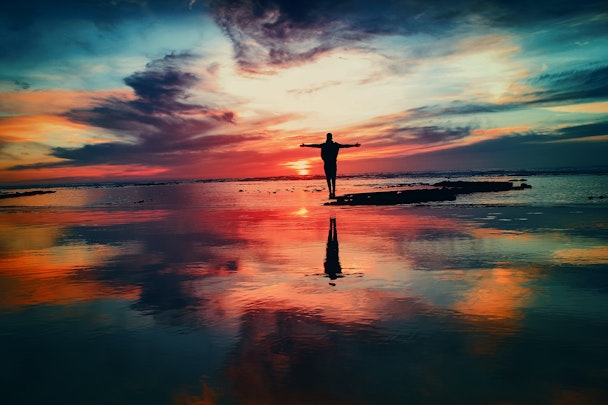We can be heroes
A dear friend of mine who lives in the US, sent me a photo the other day of some ambient marketing he spotted in his local Aldi parking lot (I know it’s sad, but we’re ad men. Plus: he lives in Florida, so it’s a break from all the craziness right now).

Wrapped around the bollards of the car park were many upright pyramids, proclaiming ’Heroes work here’ in full Aldi livery.
Now, let me state unequivocally, I think everyone serving the public just now is fully deserving of our gratitude for the risk they are taking in exposing themselves to the virus as well as the normal challenges of dealing with the cranky, often unpleasant general public.
But the use of the word ’heroes’ struck me, by a big brand about their own staff, as curious. It’s one thing to be regarded as such in common parlance but to be publicly proclaimed as such by a large multinational company confers a legitimacy that makes it official. I’m sure it will also make next year’s pay negotiations interesting: what is the going rate for a hero these days? More than a checkout assistant, I’d wager.
Now, if my local supermarket assistant is a ’hero’ then what do we call the firefighter who saves people from burning buildings? Or the lifeboat crewmember who rescues people in the dead of night in a howling gale? Or the soldier who bravely confronts unimaginable daily atrocities to protect our way of life? Hopefully, you see my point: it’s one of relativity and linguistics.
In a world of unlimited excess and innovation, where ’more’ is no longer nearly enough, are we perhaps in danger of running out of words? Because there’s only so many superlatives in the English language. Once we use them all up, that’s it: they’re gone.
Perhaps it is simply a truth that societies consume everything there is until there is nothing left to consume. There are many books prophesying that our society has already passed the cultural tipping point (it was Season 3 of The Wire, just so you know) and is now eating itself, spiraling helplessly towards civil collapse and the crumbling of the pillars of society. Just as the Romans, Greeks and Ottomans discovered before us, it doesn’t end well. I knew all this but I didn’t know that one of the symptoms of decline was that we’d wear out our words through over-use.
Of course, you could say that my profession is partly to blame and I’d say that was a fair cop, guv. We advertising types are guilty of elevating many a mundane product to heroic, nay iconic, status and in doing so, encouraging the lazy degradation of our language.
We can also look to reality TV to shoulder part of the blame. It’s breathless rush to elevate and amplify the banal lives of its ’stars’ (another worn-out word for you) drives it to ever greater feats of hyperbole, so that we end up with people who do up houses being referred to as ’gods’. Also fallen into common misuse: unprecedented, historic, unsurpassed, ultimate, superlative, peerless, titan, legend.
’Icon’ is another bête noire. Actually meaning someone ’worthy of veneration’, veneration itself being a weighty and special word, it enjoyed a giant boost in usage from 1980 onwards, hitting its apogee in this current decade (tipping point, remember?).
Recently, Kim Kardashian was described in a White House press release, no less, as an ’icon’ and she’s been frequently referred to as such with regards to fashion, business, feminism, even prison reform. But are Kim and Kanye really icons? Really-really? They’re absurdly famous, that’s in no doubt. Kim alone has over 117 million followers on Instagram, but ’worthy of veneration’? I guess it’s all in the eye of the beholder.
Adjectives have also fallen down the same dark hole. Awesome. Epic. Unmissable. Magical. Spell-binding. Like the unfathomably deep voiceover on a summer blockbuster trailer, we’re in danger of cranking the hyperbole dial to 11 so that when something truly worthy comes along, nobody will be paying attention any more.
The moral of the story? Let’s try to pull back and keep some of those special words for the genuinely deserving occasions. Not ignore or neglect them, but give them the respect they deserve. So that, come the day we really need them, they still mean what they were meant to mean.
Also, let’s put in the legwork to find the hidden gems of our language. There are words hidden in dictionaries that we rarely use that deserve an airing. Our beloved (I am contractually obliged to say that) Mission chairman, David Morgan, is something of a curator of such lost words, dropping gems such as concinnity, doryphores, sansculottes, syncretistic, bafflegab and my favourite, quaquaversatility, into his public comments regularly. And he wonders why nobody will play him at Scrabble?
At least if we exercise restraint and make the effort to use words judiciously, then when the sky does fall in, President Kardashian-West will still have words left to describe it.
But by continually reaching for words larger than we actually need, we’re in danger of dumbing everything down until, eventually, we’ll all be heroes, just for one day.
James Clifton, chief executive, Mission Group
Content by The Drum Network member:

The MISSION Group
The MISSION Group is a collective of creative Agencies led by entrepreneurs who encourage an independent spirit. If we can continue to help brands thrive with some...
Find out more
